As perceptions of the economy have continued improving, Donald Trump has generally received higher ratings for his handling of the economy than his overall job approval in public opinion polling. Over the last six months, Navigator has tracked approval of Trump overall and approval of handling the economy, and collected 345 interviews among Americans disapproving of Trump overall, but approving of his economic handling. We wanted to understand whether Trump’s relative strength on the economy among these conflicted Americans is enough to counteract other well-known challenges to perceptions of him, such as temperament and competency.
This report also looks at their demographic profile, their economic and political attitudes, and the reasons driving their complicated assessment of Trump to date.
The key takeaways:
- This is a small segment of Americans (6 percent) who are more moderate, independent, and are more likely to be male, younger, suburbanites, educated, wealthier, and people of color.
- They are very positive about the national economy and trust Trump to manage it, but demonstrate significant concern about Trump’s character and policies.
- These Americans don’t show many signs of being susceptible to President Trump’s economic message: They voted for Democrats by 20 points in 2018, and they trust Democrats in Congress far more on health care, and somewhat more on taxes and immigration.
- Perhaps most importantly, over 80% of this group
says that other factors – not the economy – will matter more to their 2020 vote, suggesting they are set to deprioritize the economy as they head to the polls next year.
A Closer Evaluation of How Americans Rate Trump
While most Americans have strong opinions about President Trump, a small but notable segment of Americans disapprove of Trump overall while approving of his economic handling.
Navigator has found President Trump’s overall job approval rating averaging at 40% approve – 57% disapprove in the first half of 2019, but this net -17 margin is significantly smaller than the net -6 margin when asking these same individuals specifically about how they approve of him on the economy (45% approve – 51% disapprove). When crossing these two questions together, the depth of polarization around President Trump is evident, as the vast majority of Americans (88%) fall into one of two categories:
- 38% are Trump Loyalists: Americans who approve of Trump overall and approve of him on the economy.
- 50% are Trump Opponents: Americans who disapprove of Trump overall and disapprove of him on the economy.
- 6% are Unsure about Trump’s performance: they are mostly unsure how to rate either Trump’s overall job performance, his economic handling, or both.
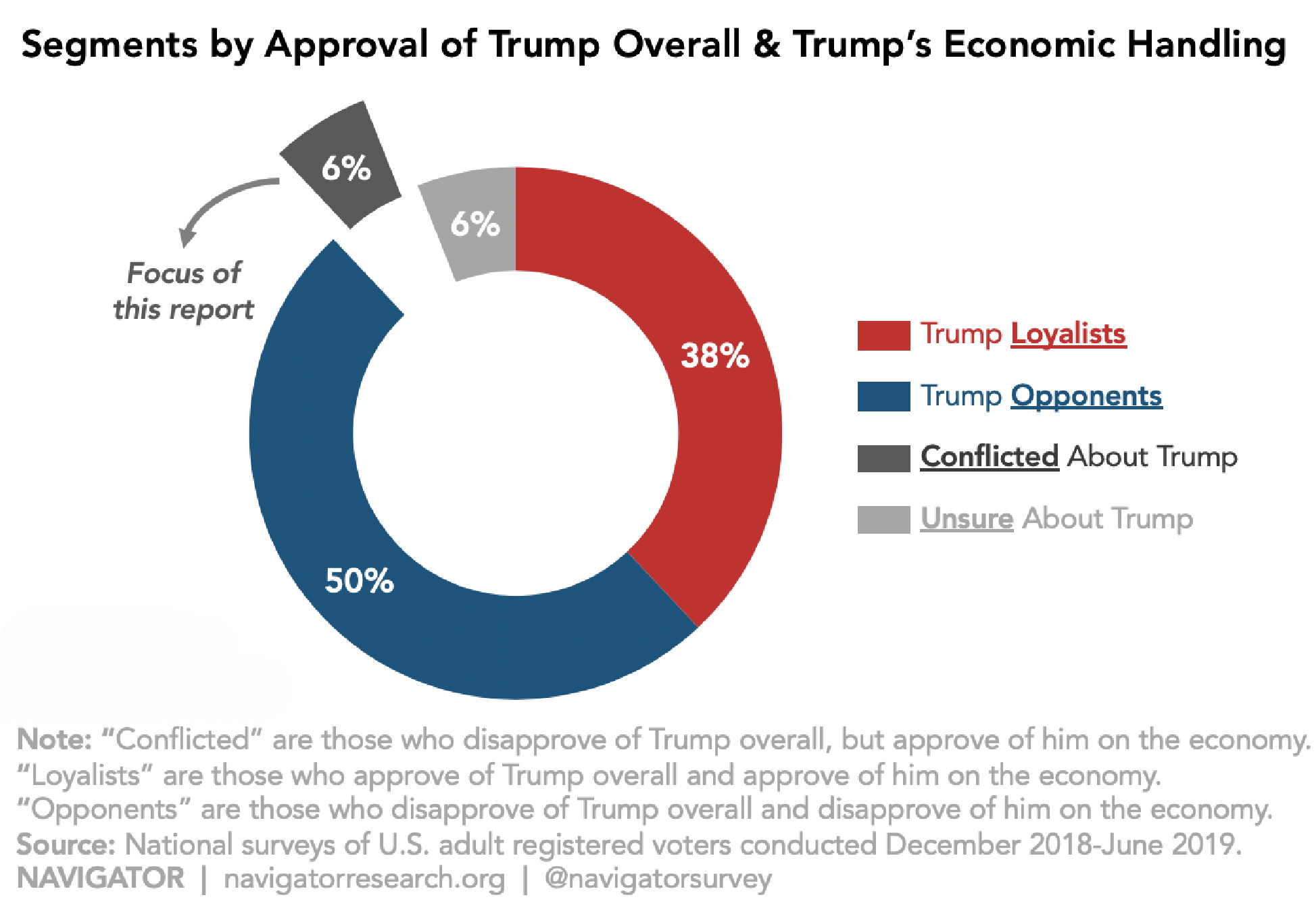
The other half (6%) are the primary focus of this report: These Americans are Conflicted about Trump’s job performance in disapproving of Trump overall, yet approving of him when it comes to his handling of the economy.
Low intensity of opinion about Trump among The Conflicted significantly differentiates these Americans from other more polarized segments. Among the Loyalist and Opponent segments, strong opinions of the president are unsurprisingly hardened: among Loyalists, 49% strongly approve of Trump and 63% strongly approve of his handling of the economy; among Opponents, intensity of opinion is even stronger, with 86% strongly disapproving of Trump overall and 74% strongly disapproving of his performance on the economy.
However, The Conflicted have softer opinions about disapproving of Trump overall and approving of him on the economy: 68% of these Americans somewhat disapprove of Trump overall, and are almost unanimous in just somewhat approving of his economic handling (94%).
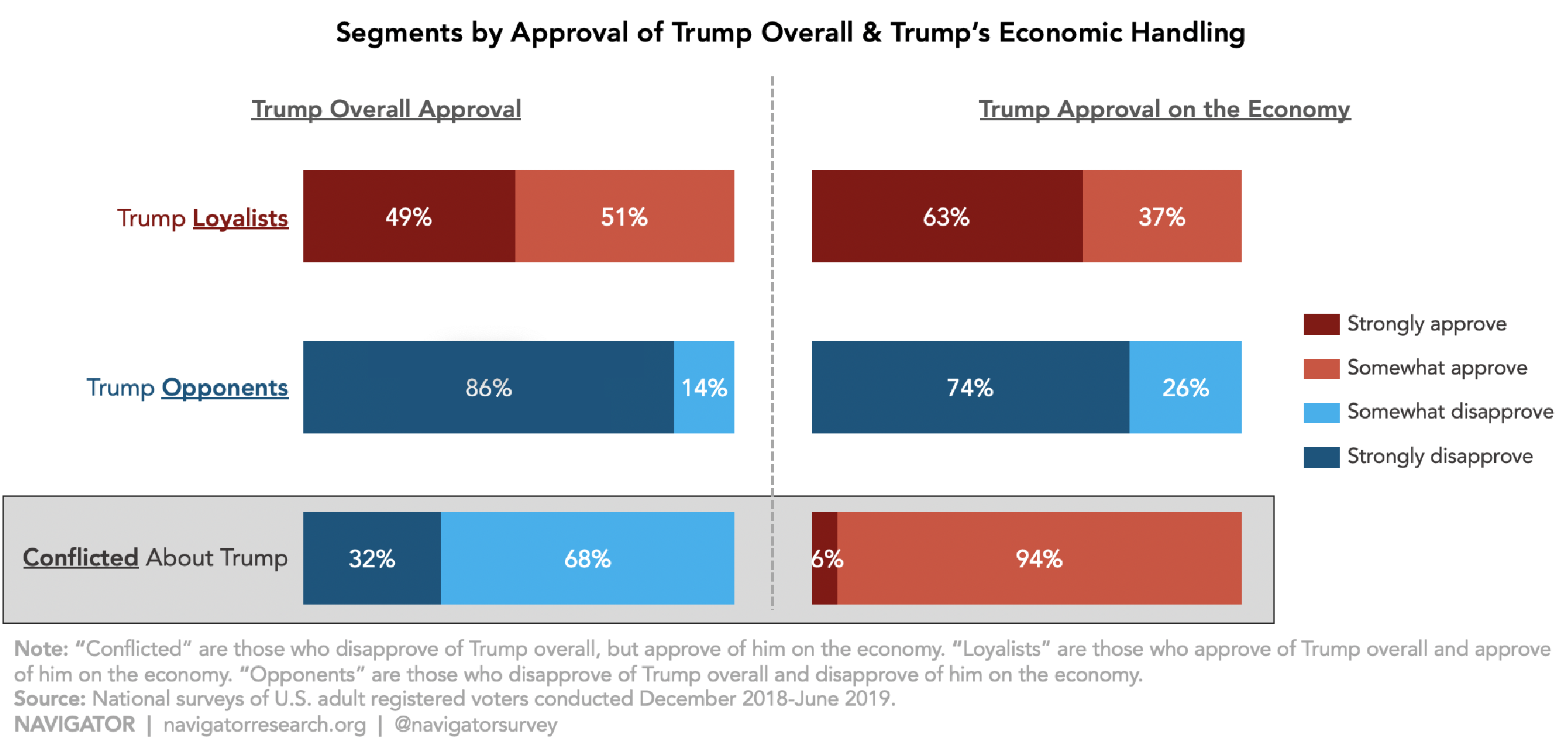
Demographic & Political Profile of The Conflicted
Americans conflicted about Trump have a very different profile than the country overall.
The most notable difference between The Conflicted and the country overall is that they are men by a nearly two to one margin (64% men – 36% women). Overall, women rate Trump more negatively, and display less willingness to give him credit on the economy. Men shift 15 points between net overall approval (-8) and net economic approval (+7) while women start with
a much lower net negative overall approval (-26) and become just 8 points more positive on net economic approval (-18).
Other demographic groups with higher levels of representation among The Conflicted than the country overall include some recently shifting leftward, such as suburbanites and those with higher levels of education and income, as well as traditional progressive constituencies like younger Americans and people of color.
Other demographic differences were not drivers, such as employment status, union household status, or region.
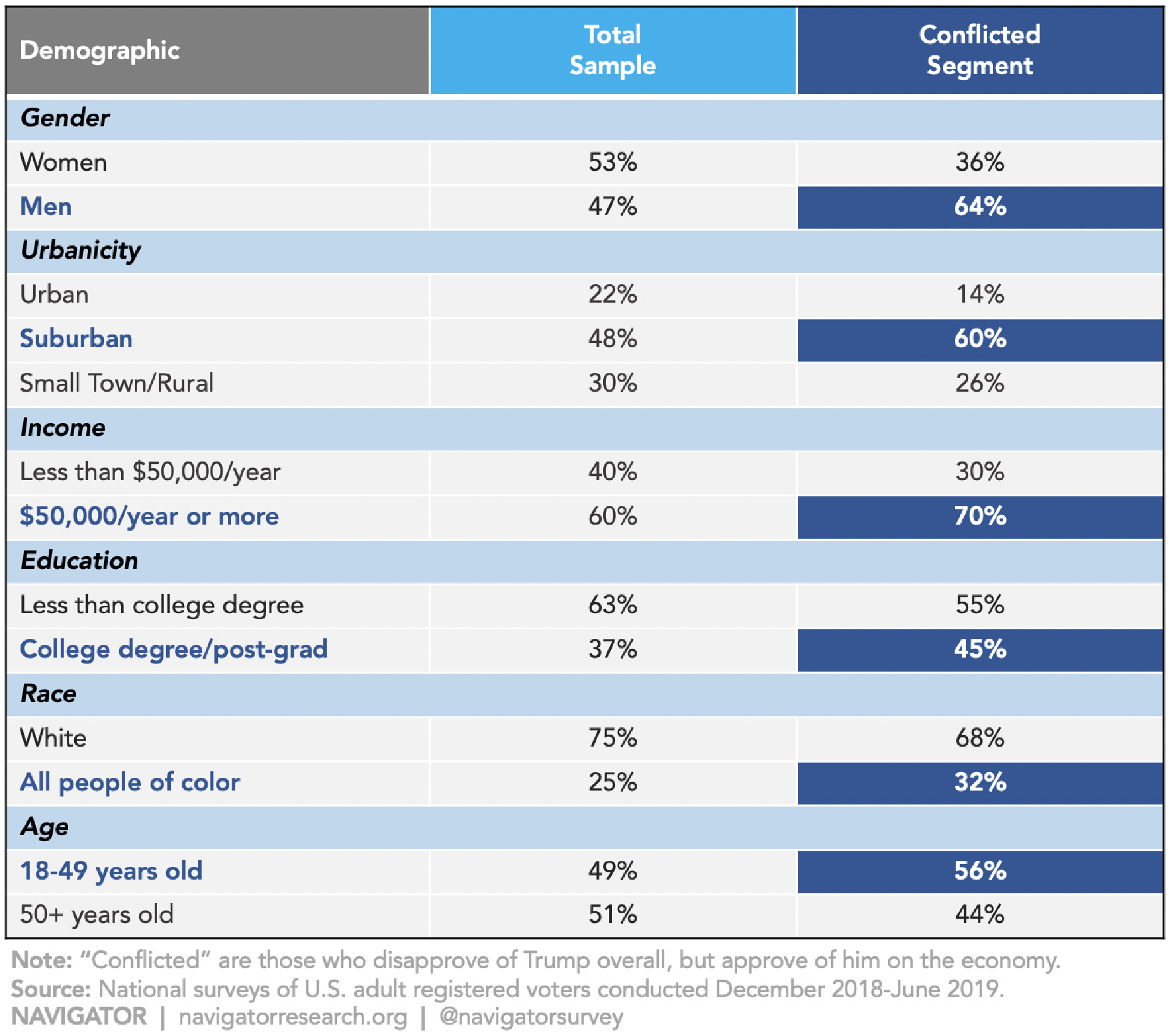
They are less likely to be ideological and were split on vote choice in 2016, but did strongly back Democratic candidates in the 2018 midterm elections.
These Americans are 12 points more likely than Americans overall to be ideologically moderate (44% vs. 32%) and 11 points more likely to identify as independents (45% vs. 34%; this includes both pure independents as well as independents who lean toward one party or another).
Given this segment is less polarized by partisanship than others, it follows that they would be more open to both supporting third-party candidates and switching votes between parties. In 2016, 29% report supporting a candidate other than Hillary Clinton or Donald Trump compared to just 12% of the country overall. Additionally, 22% of this segment switched from supporting either Trump or a third-party candidate in 2016 to voting for a Democratic House candidate in 2018. These factors may help explain why they strongly backed Congressional Democratic candidates with 58% of the vote.
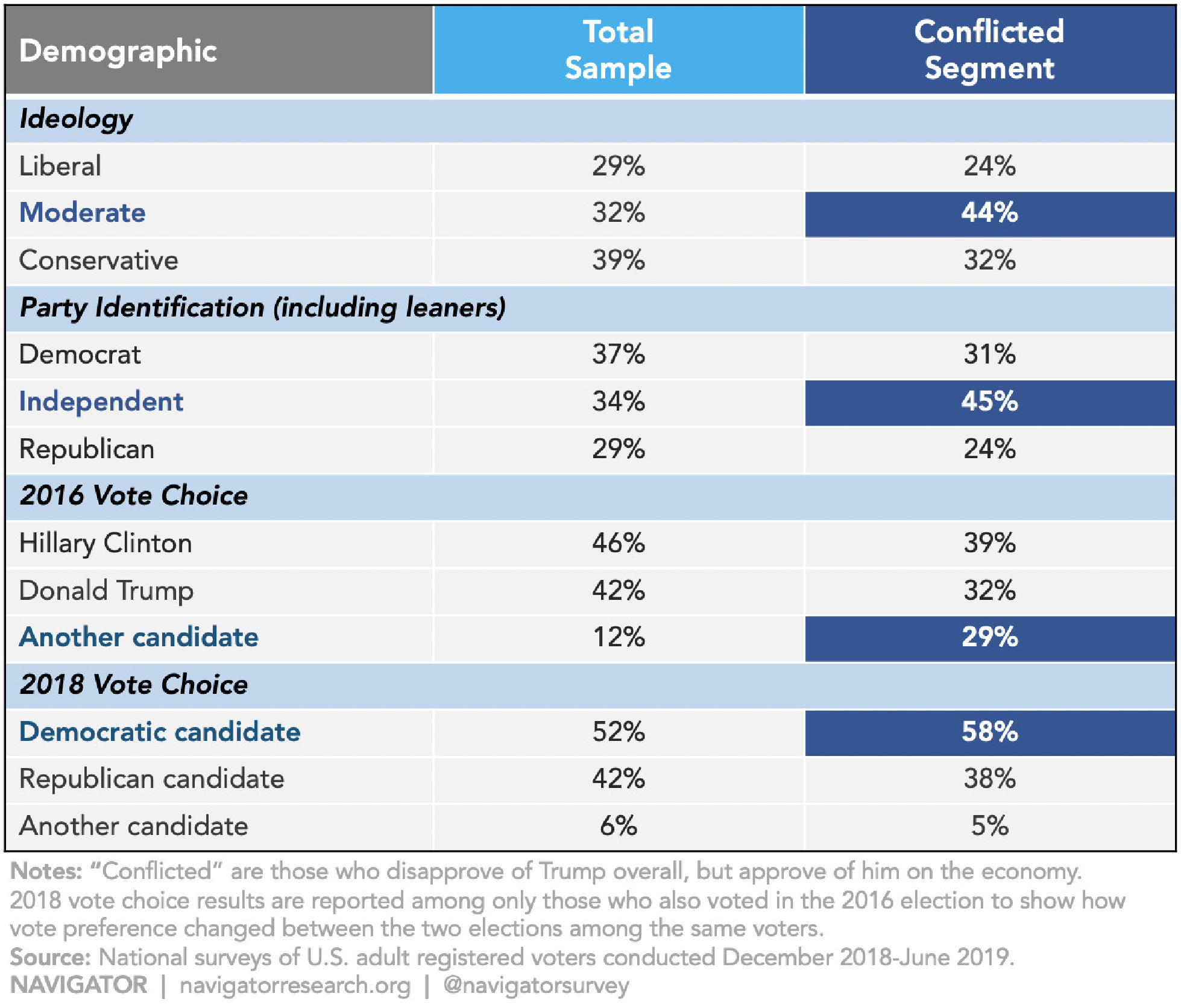
Economic & Political Attitudes of The Conflicted
Importantly, this group of Americans demonstrates higher levels of satisfaction with the national state of the economy than the rest of the country.
Overall, attitudes toward the national economy have been positive in Navigator’s tracking, averaging 58% rating the economy as “excellent” or “good” over the past six months and just 37% rating it as “not so good” or “poor.” Partisanship tends to drive perceptions of the national economy, since Loyalists rate the economy positively by an 82-point margin and Opponents rate the economy negatively by a smaller 27-point margin.
Though some progressive constituencies have higher representation among The Conflicted than the country overall, they look significantly more like Loyalists segment than Opponents on this metric: 81% rate the economy positively compared to just 16% who rate it negatively. By a much smaller margin, they are also more likely to feel confident in their own personal financial situation (61%) than does the nation overall (55%).
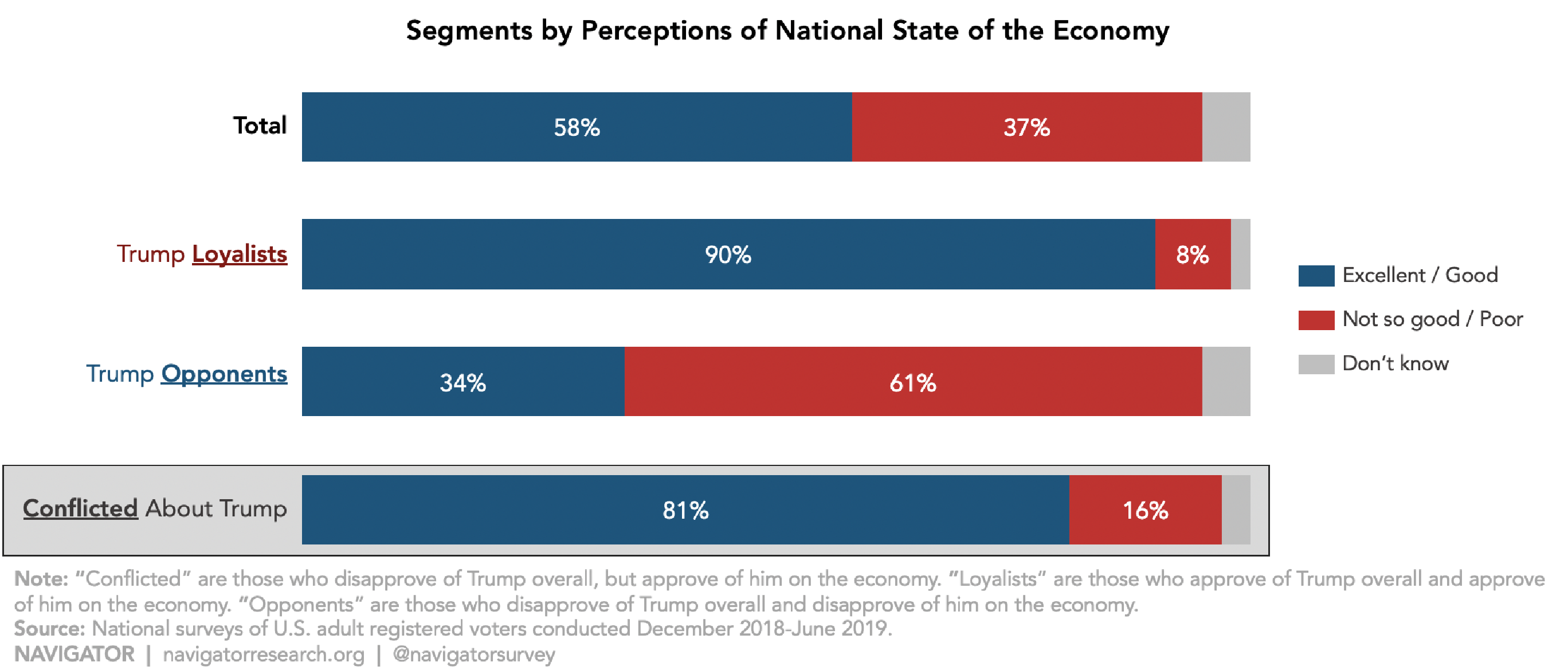
However, while they strongly trust Trump more than Democrats in Congress to handle the economy, they trust Democrats more on most other issues.
Since last year’s midterms, Trump has enjoyed an average 2-point advantage over Democrats in Congress on trust to handle the economy, but among The Conflicted, they overwhelmingly trust Trump more by a 55-point margin, 69% to 14%. Yet in spite of this Trump advantage on the economy, it does not translate to trust on other important issues.
- On health care, there is a huge trust gap among this segment favoring Democrats over Trump by a 34-point margin, 55% to 21%, greater than the 16-point advantage for Democrats overall.
- Immigration may motivate some Loyalists, but The Conflicted trust Democrats over Trump by a 10-point margin, greater than the 4% advantage for Democrats overall.
- And even on taxes, obviously connected to the economy, The Conflicted gives Democrats a 9-point edge on trust over the president, greater than the 6% advantage for Democrats overall.
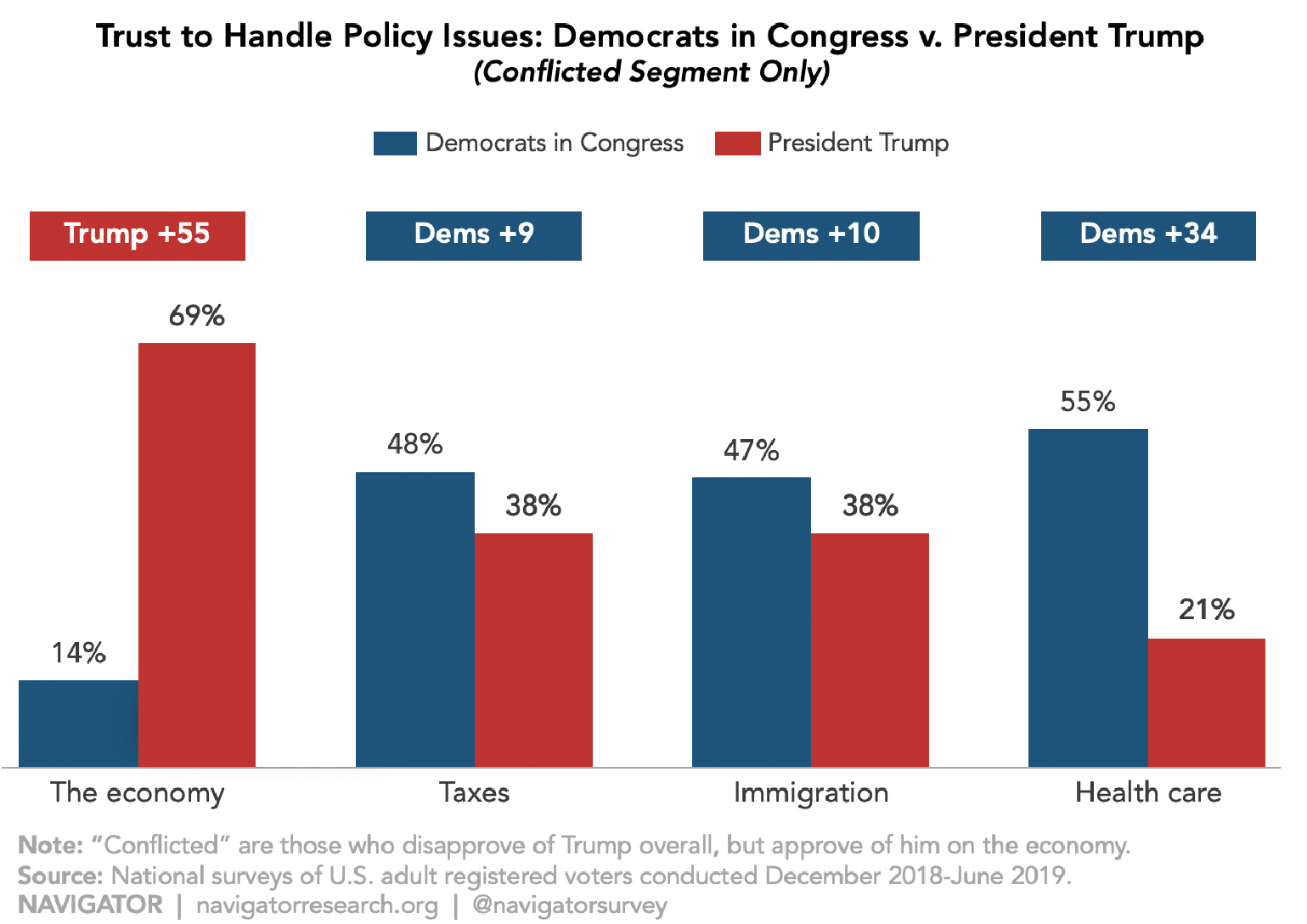
While The Conflicted look more like Loyalists when it comes to the economy, they look more like Opponents on other issues: in particular on health care, but even on issues core to Trump’s presidency, such as immigration and taxes.
What Drives Perceptions of The Conflicted
These Americans see low unemployment as a sign of a good economy, but concerns about Trump’s character and other policies give them pause about his presidency.
In the last two editions of Navigator, we asked three specific questions only to those who fall into The Conflicted to better understand their evaluation of Trump. The first was to determine whether his handling of the economy will be the biggest factor in their vote for President next year, or whether other factors will play a bigger role.
More than eight in ten (83%) of these individuals say other factors will play a bigger role in their vote decision, while only 17% say his handling of the economy will be the primary factor in their vote.
In spite of Trump’s positive association with the economy and trust among this group to handle it, other factors including character concerns and non-economic policy matters may be more important in their vote preference next year.
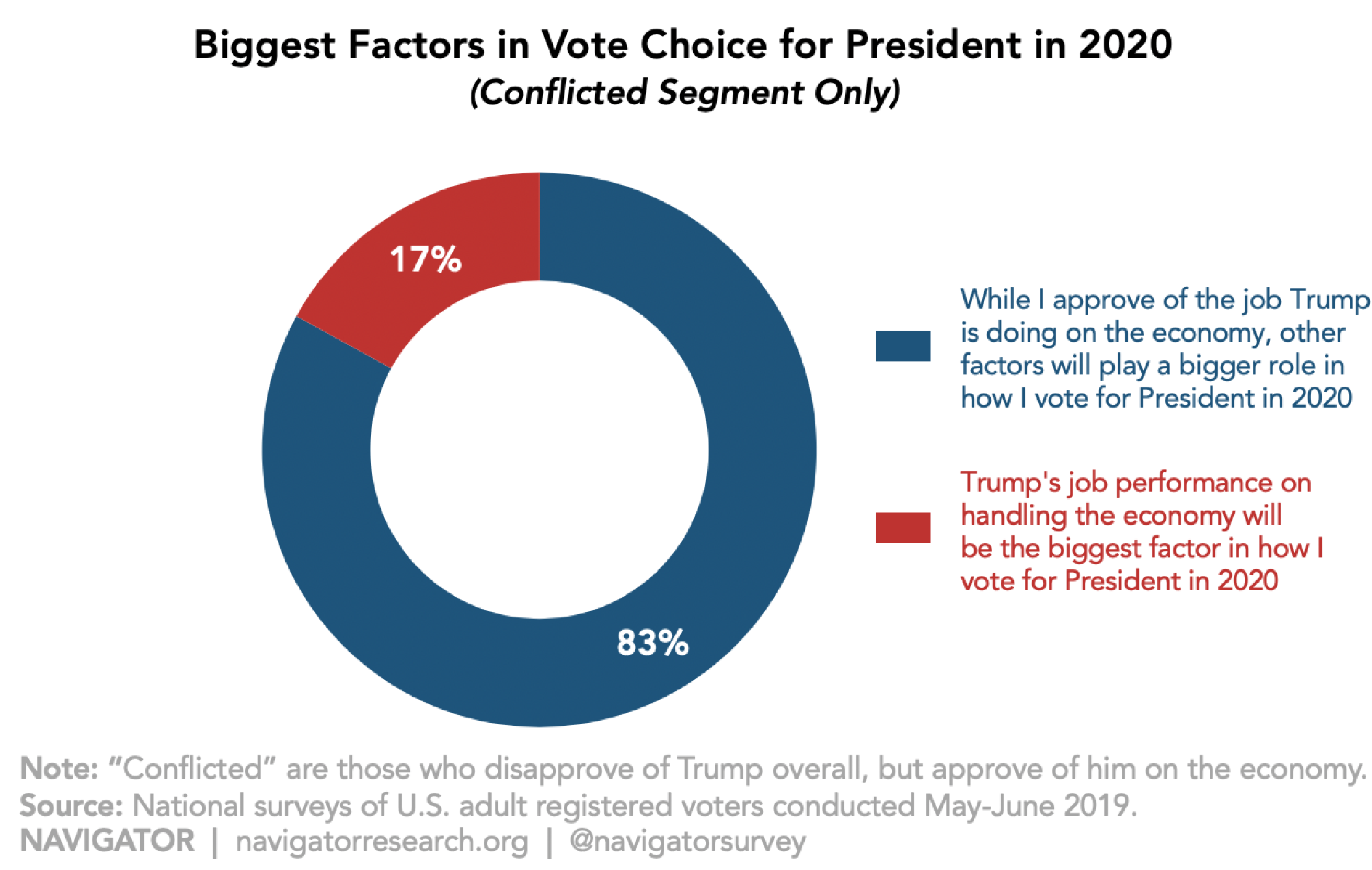
We asked some open-ends to these Americans to understand what those other factors might be. First, we asked why they disapprove of Trump overall while giving him credit for the economy. Two dimensions really pop up in this framing: one set focused more on Trump and personality, such as his use of Twitter, “lies,” and being seen as “childish”; the other set is more policy-focused, including broad mentions of “policies” and in particular, immigration. Notably, health care is not seen as very large in either word cloud, which may be a reflection of their stronger economic security.
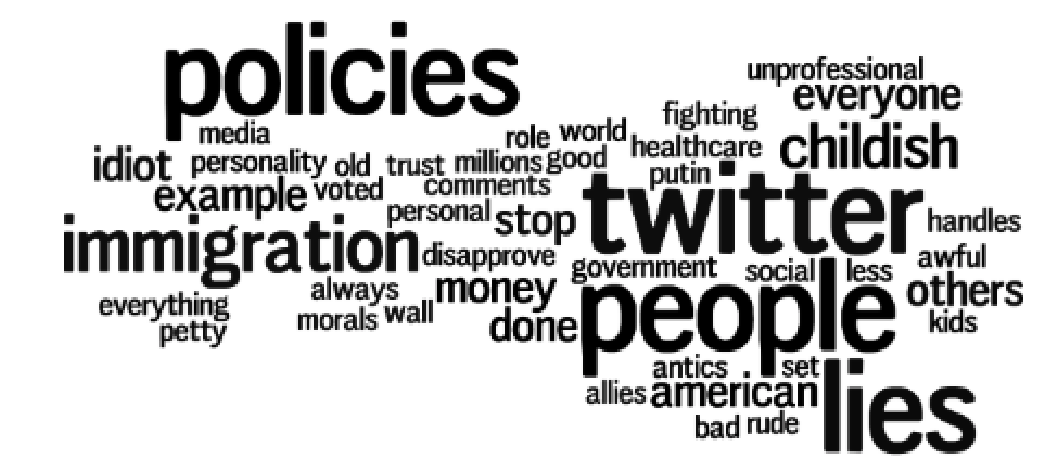
“Because of other factors such as the immigration mess, the wall, [a] women’s right to choose, [and] his unpresidential demeanor with his tweeting!!!” -Democrat
“He needs to set an example. He is a world leader. He spews awful things about everyone. He lies. He makes stuff up to suit the moment. He had very bad character faults.” -Independent
“He should quit tweeting and concentrate on the issues at hand.” -Republican
Finally, another open-ended question was framed in a slightly different way, asking why these individuals gave Trump positive marks on the economy despite disapproving of his overall job performance. A word cloud of the responses reveals that the primary driver is low unemployment, “market,” “better” generally, and “jobs,” with disparate mention of anything else.

“I don’t approve of some of the ways he does his ways, but the economy has been a little better.” -Democrat
“Trade deals, unemployment is low. Wages are rising, lowering regulations.” -Independent
“He is a businessman, so I feel that he knows what he is doing when it comes to the economy. I don’t think he knows how to handle much else.” -Republican
